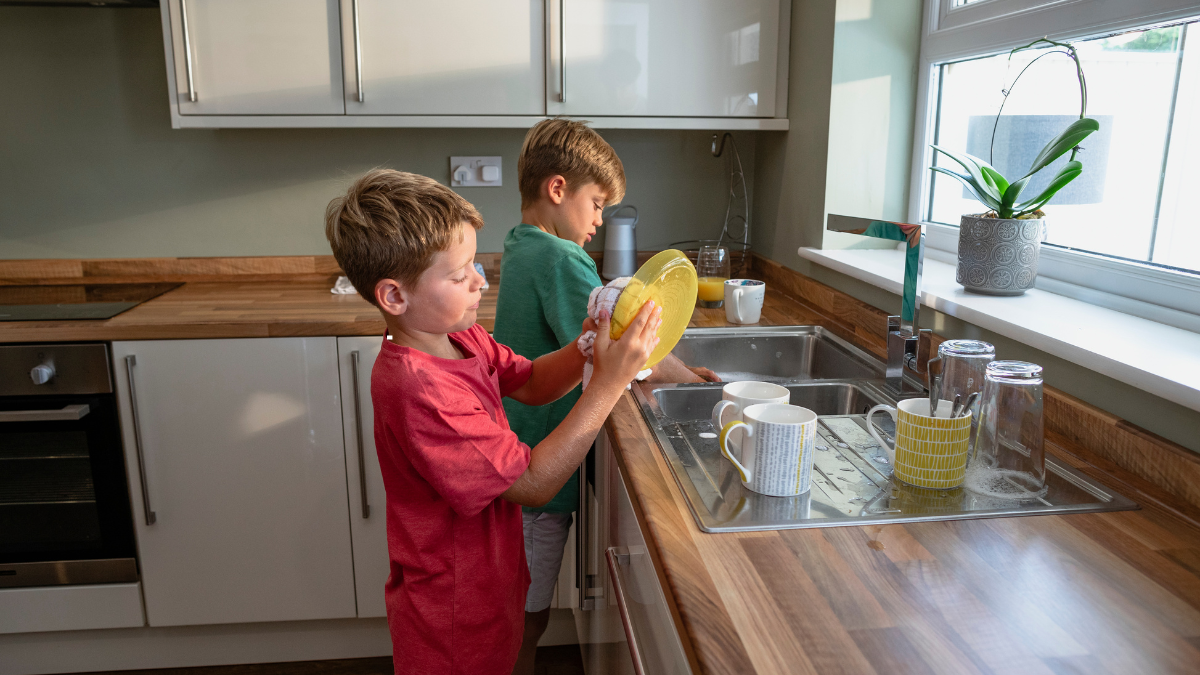It may seem like a challenge to get kids to help with chores around the house. From persuasion to using force, engaging your children in household tasks can feel like a battle. However, it’s a valuable lesson that teaches them responsibility and prepares them to grow into competent, independent adults. Household chores not only help children develop life skills but also promote teamwork and responsibility within the family.
Here’s how you can make chores fun, rewarding, and part of your children’s daily routine:
1. Begin When the Tasks Are Easy
The sooner you introduce the concept of chores, the easier it will be to build the habit. Preschool children are capable of completing simple chores, and introducing them early on prevents the development of the mindset that they shouldn’t participate in household tasks.
Start Small: Start with easy tasks like sorting toys, feeding the pets, or cleaning surfaces. These small tasks instill responsibility without overwhelming them.
Make it Routine: Incorporate chores into their everyday routine, such as cleaning up after meals or putting clothes in the hamper. The more regular the tasks, the more they’ll become automatic.
Appreciate Their Effort: Always appreciate their efforts, even if the task isn’t perfect. Positive reinforcement encourages them to continue helping.
The earlier you get your child involved in simple chores, the more responsible they will grow up to be.
Related: How to Make Your Kids Mentally Strong
2. Establish Clear Expectations and Make It Normal
When kids know exactly what is expected of them, they’re more likely to complete their chores. Being consistent in your approach makes chores a regular part of their routine, rather than a negotiable task.
Make a Chore Chart: Visual aids like a chore chart with pictures or checkboxes help children understand and track their duties. Younger children can use pictures, while older kids can use checkboxes. This gives them a sense of accomplishment as they check off tasks.
Create a Regular Routine: Assign tasks in the morning and evening. For example, making the bed in the morning and cleaning up after dinner at night. This routine teaches children that chores are a normal part of their day.
Stick to the Routine: Consistency is key. If you stick to the routine, kids will see chores as just another regular activity. Inconsistent behavior may lead to resistance or defiance.
Related: How To Make Your Kids Feel Loved
3. Turn Chores Into Games
Chores don’t have to be boring. Making them fun can motivate your child to participate enthusiastically.
Make It a Contest: Turn chores into a friendly competition. For instance, see who can clean up the fastest. This adds excitement to the task and gives children a sense of achievement.
Play Music: Create a playlist of your child’s favorite songs and play it while cleaning. The music adds energy and transforms chores into a fun activity.
Offer Rewards: Chores can be part of everyday life, but small rewards like extra screen time or a fun outing can provide additional motivation.
By making chores fun, you’ll help your child enjoy the process, and they’ll be more eager to help out.
Related: 100 Fun Things to Do With Kids
4. Give Options and Provide Autonomy
Children are more likely to do chores when they feel they have a say in the matter. Giving them choices helps them feel empowered and responsible.
Offer Them Choices: Instead of commanding, give them options. For example, ask, “Would you like to dust the shelves or vacuum the living room?” Giving them choices makes them feel in control and more willing to participate.
Let Them Do It in Their Way: Allow your child to choose how they want to complete the chores, as long as they do it properly. This encourages independence and gives them ownership of the task.
Offering choices helps reduce resistance and makes chores feel less like a burden.
Related: 50 Fun Indoor Activities for Kids (That Don’t Involve Screens)
5. Be a Good Role Model
Children learn by observing the adults around them. If you want them to do chores, you need to demonstrate a positive attitude toward work.
Lead by Example: Show your child that you’re willing to get your hands dirty, too. Whether it’s cleaning the dishes, folding laundry, or vacuuming, make sure they see you working.
Show a Positive Attitude: Even if you’re not thrilled about doing chores, let your child see that you approach them with a good attitude. Say things like, “I’m so excited to get everything organized!” Your enthusiasm will influence how your child views chores.
Engage Your Children in Your Chores: Invite your child to help with bigger tasks like washing the car or organizing the garage. By working together, you turn chores into a bonding experience.
Related: 30 Summer Activities For Kids 8-10
6. Include Chores in Their Responsibilities
As your child grows, it’s important for them to feel that they are contributing to the household. Giving them responsibility over certain tasks makes them feel like valuable members of the family.
Provide Them with a Task List: Give your child a list of chores, such as taking out the trash, feeding the pets, or doing their laundry. Having their own tasks makes them feel proud of their contributions.
Discuss the Importance of Helping: Explain why it’s important for everyone in the family to pitch in. Help them understand that their efforts make the household run smoothly.
When children feel responsible, they are more likely to take ownership of their chores.
7. Be Consistent and Follow Through on Promises
Consistency is crucial in teaching children to follow through with chores. If they fail to complete their tasks, make sure there are clear consequences.
Apply Natural Consequences: If your child doesn’t complete a chore, there should be a consequence, such as losing screen time or missing out on an activity they enjoy.
Avoid Nagging: Consistency is more effective than constant reminders. Create a routine and stick to it, so your child knows what’s expected of them. This teaches them responsibility and the importance of fulfilling their duties.
FAQ: How to Make Kids Do Chores
How can I get my child to do chores without nagging?
Make chores fun, provide choices, and reinforce positive behavior. Consistency and a set routine will also help.What can I do about resistance to chores?
Stay calm and explain the importance of chores. Offer rewards and clearly define expectations.How can I ensure chores become a routine with my child?
Start with simple tasks and build up as they grow. Use a chore chart and emphasize the importance of contributing to the family.How can I teach my child about hard work through chores?
Be a role model, praise their efforts, and make them feel proud of their contribution.What should I do if my child is too young for chores?
Start with age-appropriate tasks like picking up toys, sorting laundry, or cleaning tables. Even young children can begin learning about helping out.
Making your child do chores doesn’t have to be a struggle. By incorporating fun, providing choices, and being consistent, you can teach your children responsibility and teamwork. With patience, chores can become an enjoyable, regular part of your family life.
Save the pin for later

- 8th Month Pregnancy Care: What To Expect, Dos And Don’ts - January 17, 2026
- 80 Beautiful Hispanic Girl Names for Your Baby - January 8, 2026
- 7 Physical Signs Your Baby Still Isn’t Ready to Come Out - November 28, 2025



